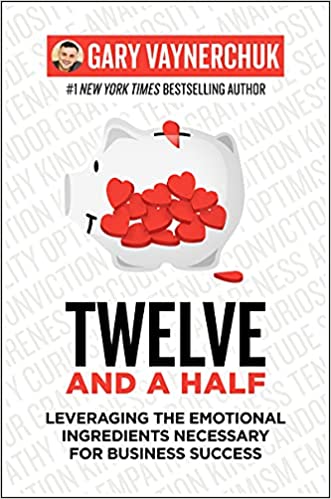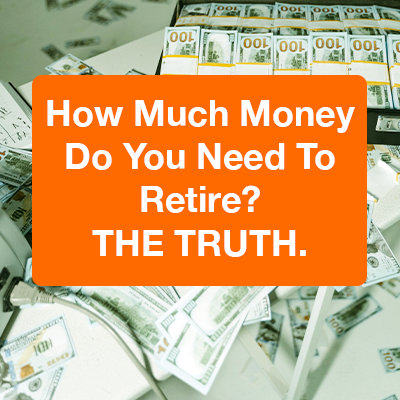In this 12 and a Half book summary, I’ll go through the 12 emotional ingredients that Gary Vee and highlight the most important takeaway in each ingredient.
While these 12 ingredients are crucial for living a great life, the main emphasis of this book is to use these 12 ingredients and apply them so you’re successful in your entrepreneurial journey. For this reason, I find this 12 and a Half book to be an unconventional, yet refreshing look at how to run a business (that isn’t just hardcore business concepts).
And because a lot of these emotional ingredients are very accessible to all of us – this book’s advice is extremely practical and can be used by anybody.
If after reading my summary below, you’re interested in a copy, pick one up here.
Why Is It Called 12 “And A Half”?
I want to address the elephant in the room, which is why is it 12.5 emotional ingredients? Gary Vee says the “half” is supposed to represent your incomplete emotional ingredient. That is, there’s always some ingredient in the dozen that you could always get better at.
The 13th ingredient is “kind candor” – or the ability to be straightforward while being kind. He says he is lacking this, so it’s half.
Hope this clears up the confusion, but it kinda doesn’t matter. Just keep in mind as you read this book that “the half” just refers to an emotional ingredient that you could improve upon.
Ingredient 1: Gratitude
Being grateful requires perspective. And that perspective is: if you’re reading this, you’re one of the most lucky people to exist, in all of history of time. Consider the following facts quoted from the book, verbatim:
- “Around 60 percent of the world’s people (4.5 billion of them) don’t have a toilet that properly manages human waste.”
- I talk about wage slavery and how you should get out of it. But apparently there’s tons of people in the world that live in actual slavery: “According to the Global Slavery Index, 40.3 million people were in modern-day slavery in 2016.”
- “According to the World Health Organization, 785 million people globally lack basic drinking-water services.2 That’s a little over 10 percent of the world’s population, and even two million Americans don’t have access to safe drinking water or basic plumbing.”
Thus, if you were to rank how lucky you are in the grand scheme of things, if you have access to water, a good toilet, and you’re not an actual slave, you’re pretty lucky compared to the rest of the world. On top of that – if you’ve got access to the internet where you get the entire world’s information at your fingertips: you’re even more lucky.
Knowing this, use gratitude as a weapon when you want to “dwell” on the small stuff. Someone cut you off in traffic? Your job is terrible? Failed business? At least you had the opportunity to start one.
No matter what things happen, just take perspective of how lucky you are compared to the rest of the world in the grand scheme of things. And keep in mind:
There’s probably more than half the world that’ll literally kill to live your life.
So, with that perspective, use gratitude to draw inspiration and give motivation to yourself to do the work required. Approach life as “I’m so lucky that I am in this position, I might as well take full advantage of it and see what happens.”
NOTE: You can draw energy from “a chip on the shoulder” – but according to the book, that fire is a lot more short-lived and a lot less sustainable than drawing motivation with gratitude. I agree, and you’ll probably be less miserable if you draw inspiration from gratefulness instead of anger.
12 And A Half Book Ingredient Two Summary: Self-Awareness
You might be great at technical stuff like coding, but bad with people. Or vice versa. Or you might be great at talking, but not writing. You might suck on video, but a wonderful podcaster.
Know your own strengths and weaknesses so you can:
- “Level-set” your weaknesses so it isn’t an extreme liability. But once you’re very mildly competent on your weaknesses,
- Double down and spend every second on your strengths ONLY. This is the ultimate time arbitrage if you want to maximize your impact and the outcomes you can accomplish in this world.
Ingredient 3: Accountability
This is the concept of realizing that 100% of the issues in your life is your fault. And that’s OK: because if you take responsibility and say “I had a part in this happening,” then you have the power to fix the problem.
But if you admit defeat and say “there was nothing I could have done” – the same problems will come up again and again and you’ll never get past it.
Taking the blame is hard, because most of us are not nice. And especially not nice to ourselves. The book advocates:
- Separating the outcome of your actions from your self-esteem
- Loving and being kind to yourself make it easier to “take the blame”. This is because people who truly are kind to themselves will easily forgive themselves for mistakes and will not care about other people’s judgement.
- Being optimistic about the future so that you won’t dwell and won’t be phased from short-term drawbacks.
- Don’t overvalue your own opinion, so that it’s much easier to say “it’s my fault”. Adam Grant’s Think Again talks a lot about this point.
Lastly, don’t overdo it. Everything is partly your fault, but you still need to give feedback to others if they’re screwing up. Otherwise, the problem won’t go away and you’ll be at fault for not giving feedback to others when they need it.
Have the balance between saying “it’s all on me” vs. “hey this employee or business partner should have done X instead of Y.”
Ingredient 4: Optimism
Emo kids confuse optimism with delusion. They are not the same thing. Optimism merely means: “Hopefulness and confidence about the future or successful outcome of something.”
Optimism takes into account reality and looks to the future with a smile and hopefulness, despite challenges.
Delusion is ignoring reality completely and losing perspective. Defined as: “a false belief or judgment about external reality, held despite incontrovertible evidence to the contrary.”
Ignoring data makes you delusional. Knowing what can go wrong, but choosing to be cautiously hopeful makes you an optimist. Using data to drive your work is explored much deeper in Jim Collins’ Great By Choice, where he talks about “Empirical Creativity” – or using data to help you be creative in your work.
In short: optimism makes playing the game much more enjoyable than just winning it.
12 And A Half Book Summary Ingredient 5: Empathy
If you follow Gary Vee, you know he’s huge on empathy. Empathy is just basically being able to understand and share the feelings of other people.
This means that if someone is trolling you in the comments section, understand that they’re in a very bad place in life right now. Instead of raising your ego and smacking those trolls down, go onto their Instagram and compliment them. Murder their mean comments with love. It’s impossible for them to win at that point. They’ll either feel like an asshole or just straight up would not have enough fuel to keep trolling you.
Gary Vee attributes most of his success to empathy. This is because empathy allows him to listen closely to the marketplace and understand what the audience wants, before they want it. It is this prediction of marketplace desires that allowed him to predict how good Web 2 and how he’s made $90 million just on launch from his fairly ugly VeeFriends IP.
Yes, I am bitter because I didn’t buy one for 3ETH when it came out because I thought $10K for 3 conferences was too expensive.
But anyway, if I had the empathy to really understand NFTs back then, then I might have bought a few.
Empathy is like a cheat code in business and life. I actually think it makes the other eleven and a half ingredients easier to use. You can handle any situation if you can feel the feelings of others involved.
For me personally, empathy is the weakest. So this is certainly “my half” to work on.
Ingredient 6: Kindness
Goes hand in hand with empathy. Basically, when someone is misbehaving, instead of being angry at them – be kind to them. Everyone’s obviously much more receptive to someone being kind to them as opposed to being mean to them.
So why is it we’re such dicks to each other all the time?
Here’s an example of kindness in the book: Gary Vee’s business partner stole $250,000 from his family business. Instead of being angry about it, he deployed empathy and tried to understand exactly what drove him to do that. After realizing the person stole $250K to feed his pain meds addiction, he wasn’t angry anymore because he understood that the context for the theft isn’t really wanting to harm Gary and his family but because the person was in the grips of addiction.
If Gary can be kind to someone that stole $250,000 from him, you can be kind to your shitty coworker also. That said: while you are being kind to them, you must also hold them accountable.
At the end of the day, if someone steals from you, you should be kind to them and be empathetic to their situation. But you still need to decide between:
- Suing them and collecting that money
- Letting them get away with it
Being kind just means having the quality of being friendly – it does not mean being a pushover. So note that kindness must also need to be balanced with accountability.
Ingredient 7: Tenacity
Being tenacious means enjoying the process so much so that you’ll push through any obstacles that come your way.
Being tenacious doesn’t mean hustle until you burnout.
And being tenacious doesn’t mean trying to achieve a goal so you can ultimately impress others. Doing so will more likely lead to you burning out since you’ll be doing something you don’t enjoy, just to impress people you don’t like.
12 And A Half Book Ingredient 8 Summary: Curiosity
Most people lack this. And it’s curiosity.
Imagine this trait as having the childlike curiosity to keep learning. Having curiosity doesn’t mean rejecting things that are foreign to you. Having curiosity means being willing to do the due diligence work on new concepts. And being curious doesn’t mean you’ll be naïve and just accept everything at face value.
You could be curious and reject 99/100 things, but you’ll damn sure have done your research on the 100 things before rejecting 99 and accepting 1.
Being curious means you’re comfortable enough with yourself to change your mind.
This is the trait that that allowed GaryVee from going from not knowing about NFTs to making $90 million off of it within a year.
Curiosity is potent when used with empathy. GaryVee’s process of combining the 2 weapons goes like this:
- Use curiosity to drive the work that you need to do to do the research on what you want to learn about.
- Deploy empathy so you can listen to the market in order to understand what’ll happen.
Once you’ve got the domain expertise from curiosity and understand the marketplace direction with empathy, execute quickly and enjoy massive gains.
Ingredient 9: Patience
The book defines patience as: “The capacity to accept or tolerate delay, trouble, or suffering without getting angry or upset”.
You might associate someone in a rush to be someone “ambitious,” and you may come to the wrong conclusion that someone who is patient is automatically not ambitious.
Ambition and patience go hand in hand because patience allows you to dream and execute on your bigger, longer-term goals. Impatience in the macro means you’re always chasing the “quick win” – and quick wins are the smallest and most unambitious wins of all.
Being patient also makes you enjoy the journey more. Knowing that your business or some big project you’re embarking on won’t turn you a million overnight, over even in the next 18 months, means you can focus on the work and not what people are saying about “how slow your progress is”. Being rushed means you’ll make careless mistakes, ultimately making your journey to success longer.
Ingredient 10: Conviction
Conviction is holding a very strong belief. Having conviction allows you to navigate the inevitable, large obstacles you’ll encounter in your journey.
Having conviction means you also won’t sway merely due to the opinion of others; you’ll only sway when you have empirical data to convince you otherwise.
An example he draws in the book is that even Elon Musk wouldn’t be able to convince him that NFTs aren’t going to be a huge thing. And his reasoning behind that is:
- Elon Musk and other successful people are successful in other arenas; thus, they have no authority to speak on NFTs. They’re focused in their respective area of competence.
- Past success does not indicate future success. This means that even if someone was very successful about a topic in the past, that in and of itself should not sway your opinion. They can be wrong this time around.
- Likewise, GaryVee would never speak about Mars or Rockets, because he knows nothing about it.
- On the other hand, GaryVee’s opinion of NFT will be swayed if the market stops buying NFTs a few years from now. This is having conviction while combining the empathy to be well-informed and grounded about market behavior.
Listening to others to sway your conviction is a huge loss, especially if you turned out to be right all along.
Ingredient 11: Humility
GaryVee disagrees with Oxford dictionary’s definition of humility, which is: “A modest or low view of one’s own importance.”
His definition of humility is:
A comfort in one’s own understanding of one’s position in the world.
Humility is not a low view of oneself. Humility is merely a grounded view of yourself and having the perspective to understand that you don’t matter in the grand scheme of things.
Humility creates a feeling of mental safety and lets you move quick. It provides the security that if you were to lose everything tomorrow, you can just downsize, re-focus, and start over again without taking a hit to your ego. Humility grants you the invincibility of not giving a shit about what other people think of you.
In a sense, humility is the highest confidence one can have. You can lose everything and be OK with starting from the ground up again and realizing you’re not entitled to anything.
Because humility allows you to move fast and become very action-oriented AKA you’re not “too good” for anything; deploying humility amplifies the efficacy of all the other ingredients.
And having humility being humble enough to change your mind if the data proves you wrong. This doesn’t just allow you to move quickly; it helps you prevent having a small mistake turn into a big mistake because you’re too stubborn to pivot.
Last Ingredient In The 12 And A Half Book Summary: Ambition
Ambition is having the very strong desire to achieve something.
And of course, you’ll need ambition if you want to achieve success in any endeavor. Without ambition, there’s no desire to do anything – so how can you drive the massive effort to succeed? You can’t.
One thing that ambition isn’t is: “I’ll make a million by the time I’m 30.” That’s called not having patience.
Ambition is having big goals, and doing it for yourself. Ambition where you need to prove something to others or ambition that’s driven by anger or a chip on the shoulder is built on the foundation of insecurity, instead of curiosity.
Ultimately, you want ambition. But fueling it with insecurity and a chip on the shoulder makes it unlikely you’ll succeed because you’ll be short-sighted (or have a heart attack).
On the flip side: fueling ambition with curiosity and self-awareness means you can do the hard entrepreneurial thing for yourself and for yourself only. This is the ultimate freedom and invincibility; you’ll be no longer held hostage to the opinions or the thoughts of others.
Review
10 out of 10.
Most business books talk about very technical things. OKRs, blue ocean strategies, and other business concepts to keep in mind. And the problem with other business books that talk about EQ is that they have a million concepts they throw at you. Study after study and 8 million things you need to do to be able to “treat people nicer”. And it’s unclear in those books how EQ will make you more money, other than on the high level.
This book is special because each emotional ingredient is shown as a weapon. And these weapons combined can accelerate the things you need to do to give you the success you need. Unlike most other books, his demonstration on how he’ll deploy these emotional ingredients allowed me to draw very concrete connections between these “fuzzy, emotional” ingredients to hardcore, bottom-line, business results.
The book also has 2 more sections, which are:
- A slew of examples of how he’ll deploy these 12 ingredients in specific scenarios. This is so you can “learn by example” to know how these weapons are deployed in real life.
- Exercises you can do to hone these 12 ingredients so you can win at not just business, but in life.
If this 12 and a Half Book Summary resonates with you, grab the book here.
PS: I get a few pennies on Amazon commission, at no cost to you if you buy this book.












0 Comments